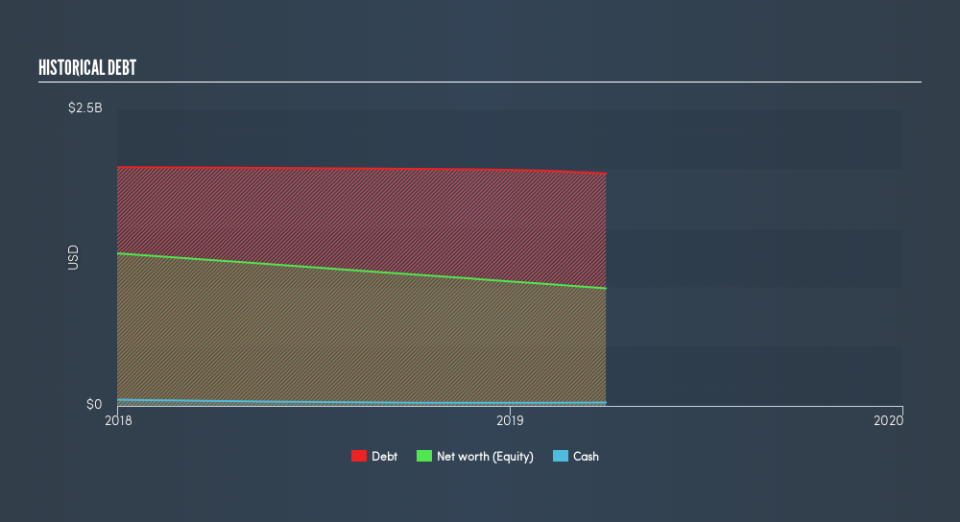Is Clarivate Analytics (NYSE:CCC) A Risky Investment?

Some say volatility, rather than debt, is the best way to think about risk as an investor, but Warren Buffett famously said that 'Volatility is far from synonymous with risk.' So it might be obvious that you need to consider debt, when you think about how risky any given stock is, because too much debt can sink a company. We note that Clarivate Analytics Plc (NYSE:CCC) does have debt on its balance sheet. But should shareholders be worried about its use of debt?
Why Does Debt Bring Risk?
Generally speaking, debt only becomes a real problem when a company can't easily pay it off, either by raising capital or with its own cash flow. If things get really bad, the lenders can take control of the business. However, a more common (but still painful) scenario is that it has to raise new equity capital at a low price, thus permanently diluting shareholders. Having said that, the most common situation is where a company manages its debt reasonably well - and to its own advantage. When we examine debt levels, we first consider both cash and debt levels, together.
View our latest analysis for Clarivate Analytics
What Is Clarivate Analytics's Debt?
As you can see below, Clarivate Analytics had US$1.96b of debt, at March 2019, which is about the same the year before. You can click the chart for greater detail. Net debt is about the same, since the it doesn't have much cash.
A Look At Clarivate Analytics's Liabilities
Zooming in on the latest balance sheet data, we can see that Clarivate Analytics had liabilities of US$711.3m due within 12 months and liabilities of US$2.08b due beyond that. On the other hand, it had cash of US$28.0m and US$343.1m worth of receivables due within a year. So its liabilities total US$2.42b more than the combination of its cash and short-term receivables.
While this might seem like a lot, it is not so bad since Clarivate Analytics has a market capitalization of US$5.05b, and so it could probably strengthen its balance sheet by raising capital if it needed to. But we definitely want to keep our eyes open to indications that its debt is bringing too much risk. There's no doubt that we learn most about debt from the balance sheet. But it is future earnings, more than anything, that will determine Clarivate Analytics's ability to maintain a healthy balance sheet going forward. So if you want to see what the professionals think, you might find this free report on analyst profit forecasts to be interesting.
In the last year Clarivate Analytics managed to grow its revenue by 3.8%, to US$965m. We usually like to see faster growth from unprofitable companies, but each to their own.
Caveat Emptor
Importantly, Clarivate Analytics had negative earnings before interest and tax (EBIT), over the last year. Indeed, it lost US$70m at the EBIT level. When we look at that and recall the liabilities on its balance sheet, relative to cash, it seems unwise to us for the company to have any debt. Quite frankly we think the balance sheet is far from match-fit, although it could be improved with time. However, it doesn't help that it burned through US$60m of cash over the last year. So suffice it to say we do consider the stock to be risky. When we look at a riskier company, we like to check how their profits (or losses) are trending over time. Today, we're providing readers this interactive graph showing how Clarivate Analytics's profit, revenue, and operating cashflow have changed over the last few years.
When all is said and done, sometimes its easier to focus on companies that don't even need debt. Readers can access a list of growth stocks with zero net debt 100% free, right now.
We aim to bring you long-term focused research analysis driven by fundamental data. Note that our analysis may not factor in the latest price-sensitive company announcements or qualitative material.
If you spot an error that warrants correction, please contact the editor at editorial-team@simplywallst.com. This article by Simply Wall St is general in nature. It does not constitute a recommendation to buy or sell any stock, and does not take account of your objectives, or your financial situation. Simply Wall St has no position in the stocks mentioned. Thank you for reading.

